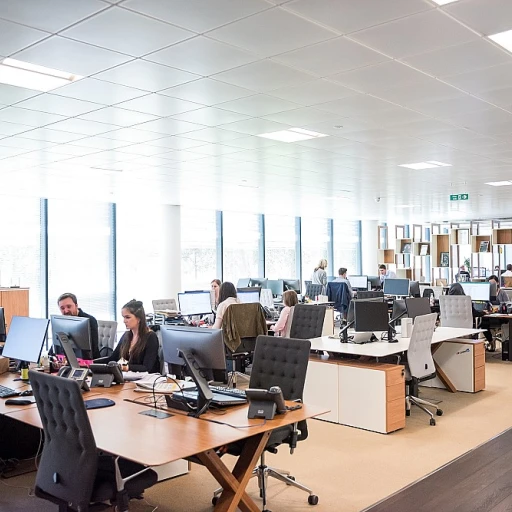
Understanding the Importance of Time Tracking
The Fundamental Need for Efficient Time Utilization
In today's fast-paced freelance landscape, the essence of time tracking cannot be understated. Freelancers thrive on flexibility, yet this flexibility demands a robust system for managing the most finite resource: time. Proper time management strategies are vital for ensuring productive work habits and efficient project completion.
Time tracking is more than just monitoring hours worked. It encompasses project management, billing, and productivity assessment, ultimately contributing to the broader spectrum of business management. Notably, software solutions like FreeAgent and Clockify provide platforms for freelancers to streamline this process, offering real-time data and allowing for multi-currency billing and project expense management.
The effective use of a time tracker can significantly benefit small businesses and free agents by providing insight into efficient work patterns while aiding in client communication and setting realistic expectations. It can also enhance transparency and trust, key factors in maintaining positive client relationships.
Furthermore, leveraging time tracking data leads to better management of work hours, allowing freelancers to create focused plans and identify areas for improvement. An accurate time tracker ensures that every billable hour is accounted for, thus optimizing both productivity and profitability.
Choosing the Right Tools for Freelancers
Selecting the Best Time Tracking Solution
Choosing the right time tracking software is a critical step for freelancers aiming to manage their work hours more effectively. With an array of options available, each offering unique features, the decision can be overwhelming. However, understanding your specific needs and priorities can significantly simplify this process.
When evaluating potential time trackers, consider the following elements to ensure seamless integration into your workflow:
- Project Management Integration: Your chosen platform should seamlessly connect with existing project management tools, enabling real-time updates and task tracking. Integrating an HR management software might also bring additional advantages in large projects.
- Expense Tracking: For freelancers managing multi-currency projects or requiring detailed expense management, finding software that offers comprehensive tracking of expenses, such as FreeAgent or Free Agent, can streamline operations.
- Ease of Use: Opt for a tool like Clockify, known for its user-friendly interface, ensuring minimal disruption to your workflow and faster adaptation.
- Privacy and Security: Always review the privacy policy of the platform to ensure your data is protected. Strong data security measures can build client trust and support project confidentiality.
Many platforms also offer free trials or tiered pricing models, allowing you to start free and assess their compatibility with your business needs before making a long-term commitment. This flexibility is particularly beneficial for small businesses operating with limited budgets.
Incorporating a robust time tracker can not only simplify time management but also improve overall project accounting. Choosing a solution that aligns with your specific business requirements will result in enhanced productivity and more accurate time management.
Integrating Time Tracking into Daily Workflow
Seamlessly Incorporating Time Tracking into Your Routine
For freelancers, integrating time tracking into daily workflows can often feel like a daunting task. However, with the right approach and tools, it can become an effortless part of your routine, enhancing overall project management and business efficiency. One of the first steps is to select a suitable time tracker. Options such as FreeAgent and Clockify offer user-friendly interfaces that allow freelancers to meticulously track time, thereby generating accurate data for accounting, project management, and invoicing. Both platforms offer a free version that accommodates many of the features that small businesses require. Once you've chosen a platform, ensure it is compatible with your existing accounting software to simplify expense management and invoicing. Platforms like FreeAgent offer seamless integration with several accounting software solutions. This not only streamlines your workflow but also supports multi-currency invoicing, an essential feature for global freelancers. To create an efficient time tracking habit, consider the following tips:- Set Clear Boundaries: Dedicate specific work hours to focus on projects without distractions. This helps in recording accurate data and enhances productivity.
- Use Software Features Wisely: Utilize features such as trigger events to automatically track time when specific tasks commence.
- Connect with Your Tools: Ensure your time tracking app connects with other tools you use daily, such as email clients, project platforms, or task managers. This reduces the need to switch between applications, saving valuable time.
- Leverage Automation: Some platforms offer real-time alerts and automated reports, allowing you to focus on your work while still keeping an eye on project timelines.
Analyzing Time Tracking Data for Better Management
Decoding Time Tracking Data for Enhanced Performance
Freelancers must regularly analyze their time tracking data to optimize work efficiency and project management. Leveraging tools such as FreeAgent or Clockify, freelancers can extract valuable insights, facilitating better decision-making for future projects.- Data Parsing: To enhance time management, break down your tracked hours into categories such as client work, administrative tasks, and personal development. This segmentation helps identify time sinks and allocate resources more efficiently.
- Identifying Patterns: Reviewing patterns in your tracked time can help highlight productivity peaks and troughs. By aligning demanding tasks with periods of high energy, performance can be maximized.
- Budget Efficiency: Compare the time spent on tasks against the billing rate agreed with clients. This provides a clear view of how projects align with profitability goals. Accounting software, integrated with time tracking apps, assists in aligning hours worked with financial outcomes.
- Project Planning: Analyzing historical data aids in predicting timelines for new projects. By understanding past workflows, freelancers can better estimate future needs, avoiding potential overruns and ensuring deadlines are met.
- Continuous Improvement: Use insights gained to refine methods and strategies. Regular analysis allows freelancers to set benchmarks for performance improvement, creating a continuous improvement loop.
Overcoming Common Time Tracking Challenges
Addressing Challenges in Time Tracking for Freelancers
Freelancers often face a unique set of challenges when it comes to time tracking. Understanding these hurdles and effectively overcoming them can significantly improve project management and ensure seamless integration of time tracking into daily workflows.- Issue: Overcomplication of Software
- Challenge: Lack of Integration with Accounting Systems
- Problem: Data Privacy Concerns
- Difficulty: Consistency in Usage
- Obstacle: Communicating Time Use to Clients
Enhancing Client Communication with Time Tracking
Improving Client Relations Through Transparent Time Management
Time tracking isn't just about managing your work hours; it's a powerful tool to enhance your client communication. By using software like FreeAgent or Clockify, businesses can monitor project progress in real-time, offering clients transparency they crave.
- Real-Time Updates: With platforms that provide real time tracking, clients can have an overview of their project's advancement. This level of transparency builds trust and fosters a strong working relationship.
- Regular Reports: Through data integration, freelancers can create comprehensive reports showcasing time spent on each task. Sending these reports, whether periodically via email or via an app, keeps the communication lines open.
- Clear Expense Management: When paired with accounting software, time trackers offer a detailed view of project expenses. Small businesses can benefit from this clarity, ensuring that project budgets are adhered to without hidden costs.
- Strong Support System: Many tracking tools come with excellent customer support. In FreeAgent, for instance, there's a plethora of video tutorials and email protected guides to assist in maximizing the tool’s potential.
For freelancers looking to enhance their client communication, leveraging these tools isn't just beneficial; it's necessary. Not only does it keep clients informed, but it also highlights your professionalism and dedication to their projects.
Remember, the key is not just to track time but to turn that data into a project management asset that strengthens your client ties and business reputation.












